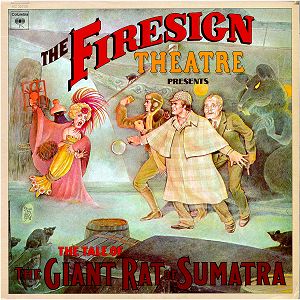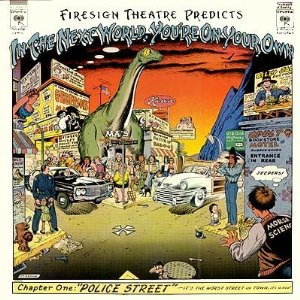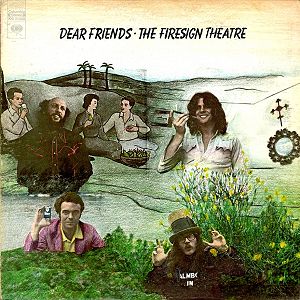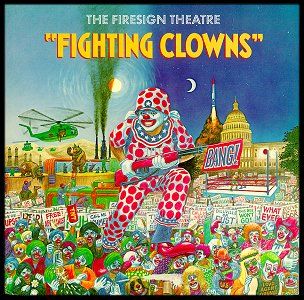
Philip Baine Austin was an American comedian and writer, best known as a member of the Firesign Theatre.

The Firesign Theatre was an American surreal comedy troupe who first appeared on November 17, 1966, in a live performance on the Los Angeles radio program Radio Free Oz on station KPFK FM. They continued appearing on Radio Free Oz, which later moved to KRLA 1110 AM and then KMET FM, through February 1969. They produced fifteen record albums and a 45 rpm single under contract to Columbia Records from 1967 through 1976, and had three nationally syndicated radio programs: The Firesign Theatre Radio Hour Hour [sic] in 1970 on KPPC-FM; and Dear Friends (1970–1971) and Let's Eat! (1971–1972) on KPFK. They also appeared in front of live audiences, and continued to write, perform, and record on other labels, occasionally taking sabbaticals during which they wrote or performed solo or in smaller groups.

Don't Crush That Dwarf, Hand Me the Pliers is the Firesign Theatre's third comedy album, released by Columbia Records in July 1970. In 1983, The New Rolling Stone Record Guide called it "the greatest comedy album ever made". It was nominated for a Hugo Award for Best Dramatic Presentation in 1971 by the World Science Fiction Society. In 2005, the US Library of Congress added the album to the National Recording Registry and called the Firesign Theatre "the Beatles of comedy."

I Think We're All Bozos on This Bus is the fourth comedy album made by the Firesign Theatre for Columbia Records, released in August 1971 on standard stereo vinyl LP, and Quadraphonic LP and 8-track tape. It was nominated for a Hugo Award for Best Dramatic Presentation in 1972 by the World Science Fiction Society.

Peter Paul Bergman was an American comedian and writer, best known as the founder of the Firesign Theatre. He played Lt. Bradshaw in the Nick Danger series.

David Ossman is an American writer and comedian, best known as a member of the Firesign Theatre and screenwriter of such films as Zachariah.

How Can You Be in Two Places at Once When You're Not Anywhere at All is the second comedy album recorded by the Firesign Theatre. It was originally released in July 1969 by Columbia Records.

Everything You Know Is Wrong is the eighth comedy album by the Firesign Theatre. Released in October 1974 on Columbia Records, it satirizes UFO conspiracy theories and New Age paranormal beliefs such as Erich von Däniken's Chariots of the Gods and claimed psychic Uri Geller, which achieved wide public attention by that time.

Proctor and Bergman was a comedy duo consisting of Philip Proctor and Peter Bergman. The two started performing in 1973 while taking a break from the four-man comedy act The Firesign Theatre, with the comedy album "TV or Not TV", on which they based a short film in 1978. They reunited the Firesign Theatre in 1974, but resumed their duo act in 1975 during a second temporary split of the Firesigns, and continued to perform as a duo during several breaks of the Firesign Theatre until Bergman's death in 2012.

The Tale of the Giant Rat of Sumatra is the seventh comedy album produced by the Firesign Theatre and released in January 1974 by Columbia Records. It is a send-up of a Sherlock Holmes adventure, "The Giant Rat of Sumatra", which was not written by Sir Arthur Conan Doyle but was referenced in his Holmes tale, "The Adventure of the Sussex Vampire", written in 1924.

The Firesign Theatre's Box of Danger: The Complete Nick Danger Casebook is a four-CD boxed set of most recorded material by comedy group the Firesign Theatre containing their fictional character Nick Danger, portrayed by Phil Austin. Danger is a parody of the hard-boiled detective genre, and is often announced as "Nick Danger, Third Eye", a parody of the term private eye. Danger stories involve stereotypical film noir situations, including mistaken identity, betrayal, and femme fatales. Danger originally appeared on the 1969 album How Can You Be in Two Places at Once When You're Not Anywhere at All, and was reprised in various live shows, radio appearances and albums, including the 1979 Nick Danger: The Case of the Missing Shoe, 1984 The Three Faces of Al, and 2001 The Bride of Firesign.

In the Next World, You're on Your Own is the ninth and last comedy album recorded by the Firesign Theatre for Columbia Records. It was released in October 1975.

Dear Friends is the Firesign Theatre's fifth album to be released on Columbia Records. It is a compilation album, collecting the Firesigns' choice of the best comedy sketches from their nationally syndicated radio program produced from September 1970 to February 1971.

Not Insane or Anything You Want To is the sixth album released by the Firesign Theatre on Columbia Records. It was released in October 1972 and includes some material that was recorded in the studio as well as some material that was recorded before a live audience. The full title is listed on the spine of the record album as Not Insane or Anything You Want To. The abbreviated title Not Insane appears on the front of the album cover, while Or Anything You Want To appears on the back cover. It is usually referred to simply as Not Insane.

Forward Into the Past is a 1976 compilation album by the Firesign Theatre. It presents the "Greatest Hits" from their nine Columbia albums and includes two tracks that were previously released only on a single.

Just Folks... A Firesign Chat is a 1977 comedy album by the Firesign Theatre. The material is based on previously unreleased material from their 1970–1972 radio shows Dear Friends and Let's Eat!. It was the only record the group made under a new contract with Butterfly Records, after the cancellation of their ten-year Columbia Records contract.

Fighting Clowns is a 1980 album by the Firesign Theatre. It is unique among Firesign Theatre albums because it is primarily made up of songs rather than the group's usual audio theater or sketch comedy pieces. Many of the songs on this album were recorded live in front of an audience while some of the songs and much of the linking material was recorded in the studio. Cover artwork was done by Phil Hartman.
Nick Danger is a fictional character created by the comedy group The Firesign Theatre, portrayed by Phil Austin. Danger is a parody of the hard-boiled detective, and is often announced as "Nick Danger, Third Eye", a parody of the term private eye. Danger stories involve stereotypical film noir situations, including mistaken identity, betrayal, and femmes fatales. Danger originally appears on the 1969 album How Can You Be in Two Places at Once When You're Not Anywhere at All, and is reprised in the 1979 Nick Danger: The Case of the Missing Shoe, 1984 The Three Faces of Al, and 2001 The Bride of Firesign.
He’s based on the [Dashiell] Hammett Sam Spade character, but as I got more into writing him over the years, he’s become much more like [Philip] Marlowe. I love [Raymond] Chandler’s writing.

Shoes For Industry: The Best of the Firesign Theatre is the eighteenth comedy album by the Firesign Theatre. Released in 1993 as a two-disk CD on Laugh.com, it is a compilation of tracks from the group's albums recorded during their Golden Age (1968–1975) for Columbia Records. It is an expanded version of the 1976 Columbia compilation LP Forward Into The Past, containing 31 tracks compared to the previous 18. Unlike that LP, it also contains some selections from two solo albums, Proctor and Bergman's TV or Not TV and Phil Austin's Roller Maidens From Outer Space. Its release was coordinated with Back From the Shadows: The Firesign Theatre's 25th Anniversary Reunion Tour.

Dope Humor of the Seventies is a compilation album by the Firesign Theatre, released by Stand Up! Records in November 2020.



















